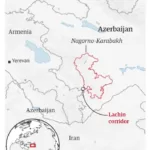In a contentious move, Iran’s parliament has recently given the green light to a new bill that could result in women facing up to a decade of imprisonment if they persist in challenging the nation’s compulsory hijab regulations.
This legislation, apart from imposing harsher sanctions on women who defy the rigorous dress code, also aims to identify and target individuals who either “promote nudity or indecency” or, alarmingly, “mock” these rules, whether in virtual or non-virtual spaces.
Leading UN human rights experts have condemned this bill as nothing short of “gender apartheid,” designed with the explicit intent to subjugate women into “total submission.”
Prominent Iranian human rights lawyer, Hossein Raeesi, lamented this development, stating, “By approving this bill, the Islamic Republic’s parliament has placed a formidable shackle on the freedom of Iranian women. Iran was already a confining prison for its female citizens, but now, they have amplified the brutality with which they will suppress women by empowering those enforcing these regulations on the streets.”
According to the judiciary’s Mizan news agency, the “bill to support the family by promoting the culture of chastity and hijab” received 152 votes in favor, 34 against, and seven abstentions. This legislation is set to undergo a preliminary three-year trial period.
However, it is crucial to note that the bill must secure final approval from Iran’s Guardian Council, a formidable institution responsible for vetting legislation and overseeing elections. The Council, comprising 12 members and headed by the 97-year-old cleric, Ahmad Jannati, who has served as its chair since 1988, wields substantial influence.
The bill outlines severe penalties for repeated “violators” of the stringent dress code, those who accrue more than four violations, and individuals deemed to be dressing “inappropriately.” It specifically targets women who wear “revealing or tight clothing” or expose any part of their body “lower than the neck or higher than the ankles or higher than the forearms.”
This approval comes mere days after the one-year anniversary of the tragic death in custody of Mahsa Amini, aged 22, who had been detained for allegedly wearing the Islamic headscarf incorrectly.
Human rights organizations have reported that security forces have detained numerous protestors across the nation this week, marking one year since hundreds were killed during protests following Amini’s death in September 2022.
In a statement, an Iranian protester, identified as Rana*, asserted, “We are not waiting for a seal of approval from the council because, on the ground, they’ve already implemented the law. Women are being followed, harassed, detained, and interrogated, like always.”
These developments have cast a shadow over the rights and freedoms of women in Iran, sparking international concern and condemnation. As the situation unfolds, it remains imperative for the global community to monitor and advocate for the protection of human rights and gender equality in the region.







